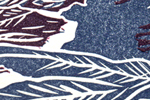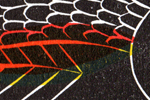Winter 2016: Prose
A Nicaraguan Spring
Fiction (A Novel Excerpt) by Pamela Russell Bejerano
* HAYDEN *
Tin roofs are unnerving. In the hot afternoon sun, they pop and twang under the pressure of the heat. They also provide a wonderful spot for snakes who crawl up on the rafters and fall asleep in the warmth, then drop onto your bed when the night cools. I’ve never met someone it actually happened to, but everyone knows someone who knows someone. I love snakes, and finding a Nicaraguan species I’ve never seen would be awesome. But finding one on my face in the middle of the night is not my idea of fun. In the rain, tin roofs are deafening, like now.
We have three months during Peace Corps training to learn Spanish, so Chris, Amanda, and I are given our own teacher and meet in my host family’s living room. It’s great, except the rain is striking the tin roof so hard we can’t hear our teacher. After several attempts at raising her voice over the clatter, our instructor pauses, then shouts that class will end early today. We retreat to the kitchen to wait out the deluge before they head home.
The kitchen roof is made of wood and the floor of dirt, so the noise is considerably less. Doña Maria, my host mother, is making tortillas and dinner as usual. She smiles at us as we enter, always happy to welcome guests into her kitchen. She is everything I expected a rural Nicaraguan housewife to be. She rarely leaves her stove, always busy making tortillas, cooking, or serving coffee to whoever wanders in. Her black and grey hair is swept up in a tight bun, and her flowered dress is thin and torn but clean beneath her dirty apron. On her feet are the same pair of faded and broken rubber flip-flops she has worn every day since my arrival. Her feet have thick, hard callouses covered by cracking, dead skin. I feel pampered and privileged in my leather boots. My soft, pink feet wouldn’t last a week in those sandals.
The kitchen is filled with scents of wood smoke, coffee, corn tortillas and her wonderful cooking. I’m hoping for chaya for dinner, my new favorite food. It’s some sort of squash, but I have no idea how she prepares it. For now, we all sit with our café y rosquillas, which is my new favorite afternoon snack. Initially we try to practice our still awkward Spanish while dunking the hard, round rosquillas into our coffee. When Doña Maria joins in and the conversation turns to the latest telenovela we gladly become listeners. It is tedious to talk with native English-speaking peers in broken, awkward Spanish.
When the rain stops, Chris, Amanda and our instructor head out just as the evening visitors begin to arrive. The rains bring a new guest who in true Nica style shakes my hand lightly, stares at my feet and offers no name, only a quiet, “Buenas.” He is not an old man, but his sad eyes, weathered skin and measured movements make me feel he’s lived several lifetimes. Shortly after his arrival, Heriberto and José, two teens from neighboring houses, wander in bringing with them a new wave of energy. When my host father, Don Angelo, shuffles in, he sends the boys out to get wood to build up the fire.
Don Angelo is a short, older man, always wearing a large straw hat and a cleanly pressed guayabera shirt. His thick glasses are perpetually coated with dirt and I’m amazed that he can see anything. He is considerably older than Doña Maria, and it is enviable how much they love each other. He spends his days tinkering around the house finding something to do to keep his calloused hands busy. Currently he is working on building an outdoor shower in spite of the fact that there is a nice tile one already in the house. I don’t know why he’s building it, and I don’t ask. I do know when he finishes it I will use it, just like the rest of the family. Elders are to be honored in Nicaragua, even when logic defies it.
José and Heriberto come back in, each staggering under the stack of wood they carry. The stranger stands and effortlessly piles both boys’ loads onto his own arms and carries them to the stove for Don Angelo, who begins to unload and stack the wood. Heriberto and José nudge each other with raised eyebrows as they return to their seats beside me.
“Luchó en la guerra” Heriberto whispers, pursing his lips and lifting his chin towards the stranger in an exaggerated gesture. I smile in spite of myself. Lip pointing is still something I have not gotten used to. My smile encourages Heriberto, who continues. “Fought with the Sandinistas.”
I am so thankful, every time they come over, that my Spanish is getting good enough to talk with them. They have taught me more about life in Nicaragua than any guide, history book, or class combined.
José leans in. “He trained soldiers in the mountains outside Estelí. Lived up there for years. Had a reputation of being able to kill men with his bare hands.”
“¿En serio?” I look back to the man.
“Seriously. Won’t talk about it now, though,” José says.
“We’ve tried to ask him about it, but all he’ll say is, ‘Lo pasado, pasado, borrón y cuenta nueva.’”
“¿Qué significa?” I ask.
“In English? Es cómo, past is past,” José starts, attempting an English translation.
Heriberto takes over. “No past. Now all new.”
The man turns from the stove and the boys immediately sit back and stare at their hands. It is obvious they are in awe of him. I sense it too, watching him return to his seat. Doña Maria hands him a café, and he thanks her, then looks at me.
“Don’t believe everything you hear,” he says in slow, purposeful Spanish.
“Dice que era soldado,” I say.
Heriberto's and José’s eyes grow huge. Apparently I have learned enough Spanish to put my foot in my mouth. If only my teacher were still here to see it. The man, however, does not seem fazed.
“Es cierto, I did fight in the war. But that was a long time ago. Pasado, pasado, borrón y cuenta nueva, right boys?”
They both turn red, even with their skin tanned from working in the fields all day. It is no surprise that this man fascinates them. Even if these intelligent boys were still in school, there would be no books to read; the only history they know is told by men like this.
“Leer que … no.” I pause to remember my past tense verbs. “Leí que Estelí ganó Somoza.” I read that Estelí won Somoza is not exactly what I’m trying to say, but I get my meaning across. At least I am understanding more than I can speak.
“Yeah,” José says, “Estelí and San Pedro both beat Somoza’s army. The only two cities in Nicaragua that did.”
“Fue horrible,” Doña Maria says, leaning back against the table, a café in her hand. The kitchen grows quiet. “This one,” she gestures to the man, “living in the mountains, boys running off to join him. One day soldiers came, said there was a meeting to recruit boys to become Sandinista rebels. All the boys went. But the soldiers were Contra spies. The house was full and they locked the door and set fire to it. Twenty-three of our boys, even two girls, dead inside, so young!”
My throat tightens, even though I’ve heard this story before. The burned-out house still stands, se vende painted on the side. For Sale.
“Two survived, though,” Heriberto says.
“One boy escaped.” Don Angelo joins the conversation, sitting beside the man after building up the fire in the stove. Doña Maria hands him a cup of coffee. “But not his cousin. He was inside.”
José and Heriberto fall over each other telling the story of the boy who survived, that he ended up being one of the most legendary soldiers in the war. Every other word they look to the man, as if the story is not truly theirs to tell. They never use the boy’s name (who must be a man by now), which I am sure is deliberate given that Nicaraguan gossip, though common, honors respectful anonymity. They are too young to remember much from the war. For them it is all hero stories about their fathers, uncles, neighbors, men and boys from town who disappeared in the mountains and came back as Sandinista Soldiers, or never came back at all. They also tell of girls who joined the fighting, or of girls who just disappeared, taken to be Contra wives. They never came back either. The two vacillate between excitement and awe. I manage to understand most of their conversation given our meshed Spanglish and their patience in answering my questions. Their stories, however, keep coming back to the boy who survived. They tell me he became a famous interrogator.
“Los capturados no sobrevivieron,” José says. “The captured, they no live.”
“No es cierto,” Heriberto corrects him. “They did survive, but only while he tortured them. They say he got more information about los Contras than anyone else.”
“He got the information that finally gave the Sandinistas the victory,” José replies.
I try to catch brief glances at the former soldier while they talk. He doesn’t contradict their stories, only stares at the floor, his face expressionless. During a brief lull I ask if what they are saying is true. He lifts his gaze to me.
“It is hard to understand stories of war in times of peace.” I can barely hear his slow, even tone above the crackle of the fire.
“Estos,” Doña Maria says, lip pointing to Heriberto and José, “tienen que oír los cuentos. They have to hear the stories. If they don’t they won’t know the horror of war. If they don’t understand that, we go to war again.”
The stranger gives Doña Maria a hard but respectful look. There is an awkward silence.
“No entendemos la guerra,” I say, finally finding the right words. There is so much I want to say, want to ask, but my Spanish is aggravatingly inadequate. “We didn’t understand what was happening here. They lied to us. The newspapers, the government.”
“Nadie lo entendía,” the man says. “Most people still don’t understand. Lies were told everywhere.”
“That’s why you need to tell these boys the truth,” Doña Maria says.
“What truth?” he replies. “Your truth? My truth? Or the truth of my friend, the man the boys talk about? No hay nada cierto. There is no truth. There are only stories, and stories change with the wind.”
We are quiet, the only sounds the crackle of the fire and the wind blowing through the walls.
“¿Y, Aída?” José asks, a broad smile on his face, “¿Pasan tardes así en su casa? ”
I laugh, thankful for the break in tension. “No,” I tell him, “evenings are not like this at my house.”
* ESTEBAN *
I wake up screaming. Eight years, still the same dream. A cold breeze blows in through the window. Sweat drips down my back. I sit up and hold my head between my hands, but cannot stop the throbbing. I pull my t-shirt off and wipe the sweat from my face, chest and back. In his bed, just two feet away, my father sleeps. His face is peaceful. Nothing disturbs him in sleep. I envy him this.
I go into the kitchen, dip my cup in the water bucket and drink. The dream plays back in my mind. A Contra soldier in my chair. Tied up. Fear in his eyes. They change. The eyes of my cousin. He is screaming for me to free him. We smell smoke and I struggle to untie him. The fire grows, begins to engulf us. I cannot free him. I wake up screaming.
Gustavo, my friend and doctor, says that waking up screaming is good, that I always beat the death waiting there for me.
“What happens if I don’t beat it?” I asked him one day.
“You willing to stay in the dream to find out?”
I stared at him.
“No,” I said, finally.
Not while my Papá needs me.
“Good,” he patted my shoulder. “Then we’ll be okay with never knowing.”
I trust two people in the world. He is one, my father is the other.
I pull on my sweatshirt and walk out back. With no moon and no blinding electricity for 15 kilometers, blazing stars eclipse the black sky. My sister’s voice floats on the wind.
“Every star is an angel, Esteban, that watches over us and keeps us safe.” As a child she would take me outside to look up at the stars. Years later when I told her I didn’t believe in angels she cried. I never told her again. I take my eyes from her sky and look down at the dirt. That is something I can believe in. I bend down and take a fistful. I let the rocks and sand slide through my fingers. This ― the earth, the soil, the crops ― this is the only thing that has kept me from going mad since the war. And now even that will be compromised.
Last week a man named Francisco came from the U.S. Peace Corps and held a town meeting to tell us about our new volunteer. Francisco was dressed in expensive jeans and a dress shirt. His boots were clean and new. He tried to look like one of us, but no one here has new boots. Francisco told us the U.S. Peace Corps was doing good work in Nicaragua, and in countries all over the world igual al nuestro. Just like ours. There is no country just like Nicaragua. Did he know nothing of our war? Our history? Our people? He is the son of bourgeois. His truth is academic, not authentic. I decided I did not trust him.
“Va a ayudar con la cosecha. But not just the crops, help teach the women to plant vegetable gardens, and help your community grow.”
He sounded like a salesman. The men and women nodded, all in agreement. I stood at the back. I tried to imagine what this person could offer. Then Francisco told us it would be a woman. The group grew quiet. Carlos finally spoke.
“She will be welcome in our community.”
When I arrived home I was angry.
“¿Que te pasó? ” my father asked. “What happened? You don’t like that a new missionary is coming.”
“She’s not a missionary. Es voluntaria del Cuerpo de paz.” He looked at me with his brow furrowed. I explained more. “Va a vivir en el pueblo por dos años.”
“Living here, for two years?”
I nodded. We had never had a foreigner live here. Even the missionaries were Nicaragüense.
“¿Voluntaria? ¿Es mujer? ”
I nodded again.
“A woman to teach us about farming and gardening. That is not something the men are used to.” He looked to me, his question unasked.
I leaned back and sighed. “A stranger living here is fun for them, different,” I answer. “But I don’t know that they will accept her as a colleague, to teach them.”
Papá was quiet for several minutes. “It will be up to you, then, to show them.”
I dismissed his words. Now they play through my mind. My father is the one person who can push me beyond my safe and guarded world. In this, though, I am sure he is wrong. We do not need another U.S. American with blood-stained hands to come and tell us what she thinks we don’t know. What we need is water, healthy soil and forests. This gringa cannot bring us these things. But Carlos welcomed her. So she will come, and for two years the town will believe her. Then she will leave, and again I will pick up the pieces.
Frustrated, I go inside, put on my shoes and go out to run up my hill. At the top, the sun peeks over the eastern foothills and warms my face. I take a deep breath and feel the anger drain from my body. The throbbing in my head has decreased. I stand and face the sun. If I believed in God I would pray for rain, pray my nightmares would cease, pray for my father’s health. I might even pray for tolerance.
| |

|

|
 |
 |
 |
 |
 |
||||
|
Celebrating nature, home and the cycles of life – twenty poets light the winter night. |
Six stories use magic to explore loss, grief and healing. |
With imagery of flora and fauna, four artists animate the winter landscape. |
Five young women dig deep to each speak their individual truth . |
From emerging to established writers – meet the women behind our eighth issue’s voices and visions. |

|
LETTER FROM THE MANAGING EDITOR
POETRY Northwest Equinox by Kris Demien Gradations of Gray by Wendy Thompson With Gladness by Sara Graves Home by Leora Marialicia González For a Grade School Classmate by Joan Maiers Canning Factory Road by Elizabeth Stoessl To Make a Prairie by Carolyn Martin At Home by Suzy Harris Family Disagreement by Tricia Knoll The Bullfrogs by Katherine Boyer Cows by Rebecca Jamieson Lesson by Stacey Vallas Stardust by Erin Iwata Perspective by Carolyn Martin Lacrosse Season by Elizabeth Harlan-Ferlo The Tangled Path by Suzanne LaGrande Matched Set by Tanya Jarvik False Bus Stop by Elizabeth Harlan-Ferlo Last Visit by Erin Iwata October Walk with My Mother by Ann Sinclair First Rothko Exercise by Elizabeth McLagan Fractions by Susan Blackaby Tea by Melineh Yemenidjian Return by Stacey Vallas PROSE Scarab Man by Cynthia McGean Planetary Influences by Alida Thacher Bone of the Past by Burky Achilles Teachings: A Buddhist Ghost Story by Ann Sihler Wrangler by Desiree Wright A Nicaraguan Spring by Pamela Russell Bejerano FEATURED ART Into the Wonder by Annamieka Hopps Davidson Deep Blue Meditation by Annamieka Hopps Davidson Weave Me Into the Sea by Annamieka Hopps Davidson Crassula 2 by Alison Foshee Crassula 5 by Alison Foshee Crassula 6 by Alison Foshee Warm Autumn by Tamar Hammer Girl with Conch by Tamar Hammer With Her Dog by Tamar Hammer YOUNG VOICES Love Beyond Loss by Isabel Lickey Submerged by Raimy Khalife Hamdan Which Way? by Alli Rodenbaugh To Autumn by Sara Barkouli The Storm by Elie Doubleday CONTRIBUTORS |
